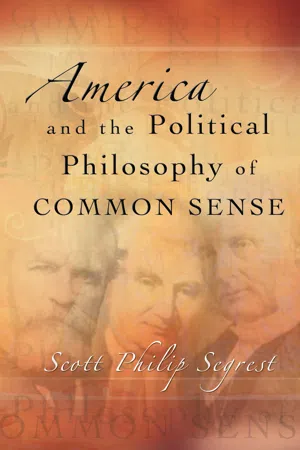
- English
- ePUB (mobile friendly)
- Available on iOS & Android
The Eric Voegelin Institute Series in Political Philosophy
About This Book
From Aristotle to Thomas Jefferson, seminal thinkers have declared "common sense" essential for moral discernment and civilized living. Yet the story of commonsense philosophy is not well known today. In America and the Political Philosophy of Common Sense, Scott Segrest traces the history and explores the personal and social meaning of common sense as understood especially in American thought and as reflected specifically in the writings of three paradigmatic thinkers: John Witherspoon, James McCosh, and William James. The first two represent Scottish Common Sense and the third, Pragmatism, the schools that together dominated American higher thought for nearly two centuries. Educated Americans of the founding period warmly received Scottish Common Sense, Segrest writes, because it reflected so well what they already thought, and he uncovers the basic elements of American common sense in examining the thought of Witherspoon, who introduced that philosophy to them. With McCosh, he shows the furthest development and limits of the philosophy, and with it of American common sense in its Scottish realist phase. With James, he shows other dimensions of common sense that Americans had long embraced but that had never been examined philosophically. Clearly, Segrest's work is much more than an intellectual history. It is a study of the American mind and of common sense itself—its essential character and its human significance, both moral and political. It was common sense, he affirms, that underlay the Declaration of Independence and the founders' ideas of right and obligation that are still with us today. Segrest suggests that understanding this foundation and James's refreshing of it could be the key to maintaining America's vital moral core against a growing alienation from common sense across the Western world. Stressing the urgency of understanding and preserving common sense, Segrest's work sheds new light on an undervalued aspect of American thought and experience, helping us to perceive the ramifications of commonsense philosophy for dignified living.
Frequently asked questions
Information
Table of contents
- Cover Page
- Title Page
- Copyright
- Dedication
- Contents
- Abbreviations Used in the Text
- Acknowledgments
- 1. Introduction
- 2. Common Sense and the Common Sense Tradition
- 3. Witherspoon's “Plain Common Sense”
- 4. McCosh's Scientific Intuitionism
- 5. The Common Sense Basis of James's Pragmatic Radical Empiricism
- 6. The Common Sense Basis of James's Moral and Social Theory
- 7. Conclusion
- Notes
- Selected Bibliography
- Index